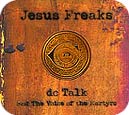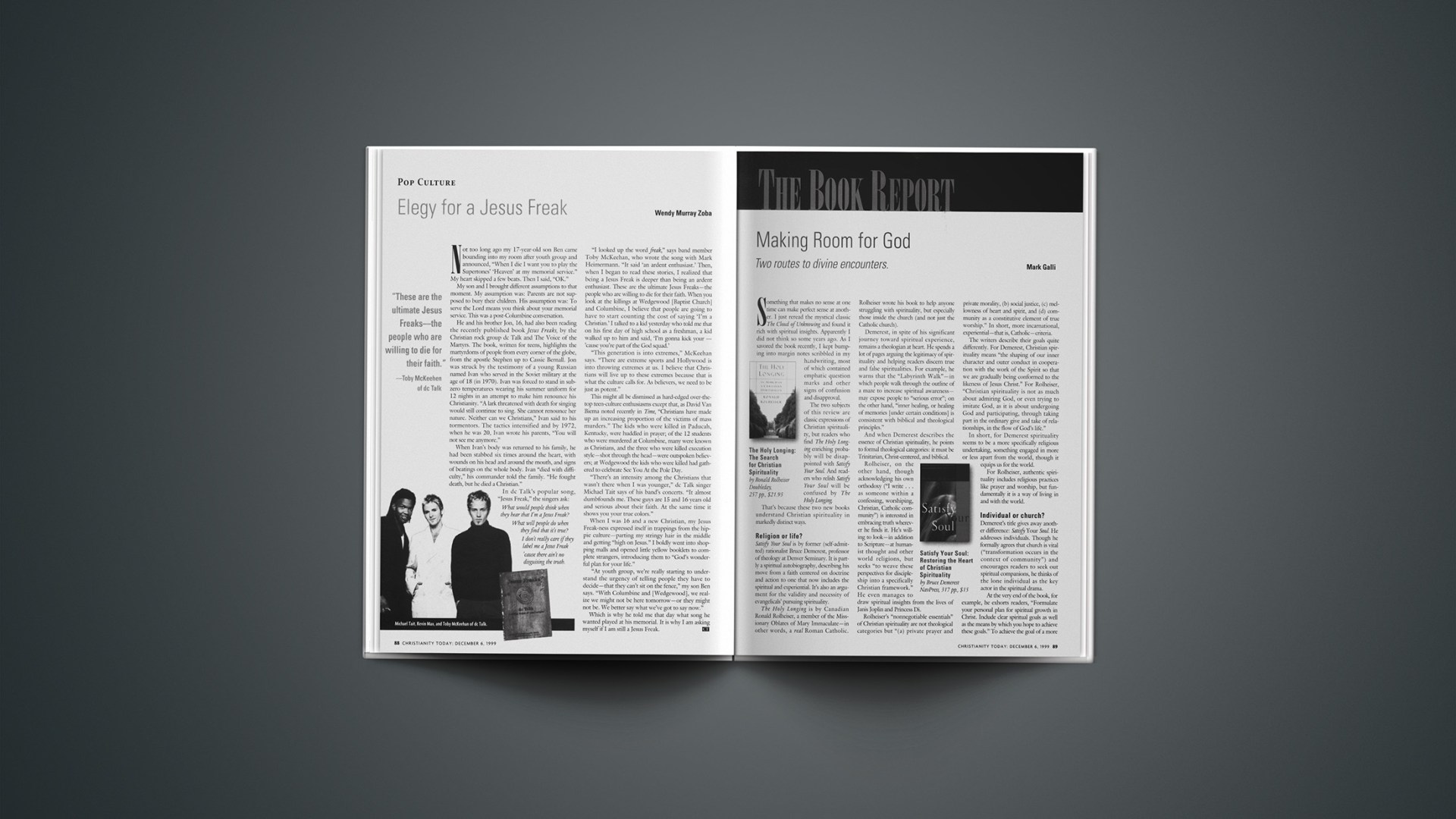Not too long ago my 17-year-old son Ben came bounding into my room after youth group and announced, “When I die I want you to play the Supertones‘ ‘Heaven’ at my memorial service.” My heart skipped a few beats. Then I said, “OK.”
 Tim Pawlenty ended his campaign for the Republican nomination yesterday, the day after Pawlenty ended a distant third in the Ames Straw Poll. The poll is non-binding, but it is an early test of a candidate’s campaign strength. Pawlenty’s campaign was well-organized, but it did not have the excitement and dedicated following of Rep. Michele Bachmann or Rep. Ron Paul, each of whom finished far above him in the poll. The departure of Pawlenty is unlikely to shake up the GOP field, but it does raise the question about evangelicals in the Republican party. Pawlenty was the type of candidate that mainstream evangelical leaders would like. In June, 45 percent of the National Association of Evangelicals leadership said Pawlenty was their top-pick for the GOP candidacy. The next favorite pick—”no preference,” followed by former Massachusetts governor Mitt Romney.Pawlenty has evangelical bona fides. His pastor is Leith Anderson, president of the NAE who officiated Pawlenty’s marriage in 1987. Pawlenty also had the support of former Arkansas governor Mike Huckabee. Standing next to Pawlenty at an event at the Iowa State Fair, Huckabee said, “I’m endorsing the principles of people who will stand for a smaller, more efficient government, lower taxes, the sanctity of life. And I wouldn’t be on this stage if this guy didn’t stand for those things.”Dave Peterson, a political science professor at Iowa State University, told CT that Pawlenty was the only candidate that was acceptable to everyone, but he couldn’t inspire enough voters to be a viable candidate.“Pawlenty’s strategy was a decent one in theory,” said Peterson, who was at the Iowa State Fair on Saturday. “His hope was that there would be a deadlock between candidates who were unacceptable to sizable portions of the party. Social conservatives wouldn’t trust Romney, more establishment Republicans wouldn’t trust Bachman, and lots of folks wouldn’t trust Paul.”Speaking on ABC’s This Week, Pawlenty said the Republican voters this year were looking for a different kind of candidate. “What I brought forward I thought was a rational, established, credible, strong record of results, based on experience governing – a two-term governor of a blue state – but I think the audience, so to speak, was looking for something different,” Pawlenty said.This comment was considered to be a thinly veiled critique of Bachmann. Pawlenty focused on his fellow Minnesotan during last week’s Iowa debate where he suggested that she was:– irrational (“Her answer is illogical”)– unestablished (“It’s not her spine we’re worried about, it’s her record of results.”)– not credible (“She’s got a record of misstating and making false statements”)– with no record of results or experience (“In Congress, her record of accomplishment and results is nonexistent.”)But it was Bachmann who won the straw poll, even though her campaign was less organized than Pawlenty’s.In January, Pawlenty told CT that to build a viable campaign he needed to build name recognition and raise funds. Speaking yesterday, Pawlenty said he needed a stronger showing in the straw poll to keep raising funds.“We had some success raising money, but we needed to continue that and Ames was a benchmark for that, and if we didn’t do well in Ames, we weren’t going to have the fuel to keep the car going down the road,” Pawlenty said.Minnesota Public Radio suggests a Senate run could be Pawlenty’s future.Image via Pawlenty’s campaign.
Tim Pawlenty ended his campaign for the Republican nomination yesterday, the day after Pawlenty ended a distant third in the Ames Straw Poll. The poll is non-binding, but it is an early test of a candidate’s campaign strength. Pawlenty’s campaign was well-organized, but it did not have the excitement and dedicated following of Rep. Michele Bachmann or Rep. Ron Paul, each of whom finished far above him in the poll. The departure of Pawlenty is unlikely to shake up the GOP field, but it does raise the question about evangelicals in the Republican party. Pawlenty was the type of candidate that mainstream evangelical leaders would like. In June, 45 percent of the National Association of Evangelicals leadership said Pawlenty was their top-pick for the GOP candidacy. The next favorite pick—”no preference,” followed by former Massachusetts governor Mitt Romney.Pawlenty has evangelical bona fides. His pastor is Leith Anderson, president of the NAE who officiated Pawlenty’s marriage in 1987. Pawlenty also had the support of former Arkansas governor Mike Huckabee. Standing next to Pawlenty at an event at the Iowa State Fair, Huckabee said, “I’m endorsing the principles of people who will stand for a smaller, more efficient government, lower taxes, the sanctity of life. And I wouldn’t be on this stage if this guy didn’t stand for those things.”Dave Peterson, a political science professor at Iowa State University, told CT that Pawlenty was the only candidate that was acceptable to everyone, but he couldn’t inspire enough voters to be a viable candidate.“Pawlenty’s strategy was a decent one in theory,” said Peterson, who was at the Iowa State Fair on Saturday. “His hope was that there would be a deadlock between candidates who were unacceptable to sizable portions of the party. Social conservatives wouldn’t trust Romney, more establishment Republicans wouldn’t trust Bachman, and lots of folks wouldn’t trust Paul.”Speaking on ABC’s This Week, Pawlenty said the Republican voters this year were looking for a different kind of candidate. “What I brought forward I thought was a rational, established, credible, strong record of results, based on experience governing – a two-term governor of a blue state – but I think the audience, so to speak, was looking for something different,” Pawlenty said.This comment was considered to be a thinly veiled critique of Bachmann. Pawlenty focused on his fellow Minnesotan during last week’s Iowa debate where he suggested that she was:– irrational (“Her answer is illogical”)– unestablished (“It’s not her spine we’re worried about, it’s her record of results.”)– not credible (“She’s got a record of misstating and making false statements”)– with no record of results or experience (“In Congress, her record of accomplishment and results is nonexistent.”)But it was Bachmann who won the straw poll, even though her campaign was less organized than Pawlenty’s.In January, Pawlenty told CT that to build a viable campaign he needed to build name recognition and raise funds. Speaking yesterday, Pawlenty said he needed a stronger showing in the straw poll to keep raising funds.“We had some success raising money, but we needed to continue that and Ames was a benchmark for that, and if we didn’t do well in Ames, we weren’t going to have the fuel to keep the car going down the road,” Pawlenty said.Minnesota Public Radio suggests a Senate run could be Pawlenty’s future.Image via Pawlenty’s campaign.
He and his brother Jon, 16, had also been reading the recently published book Jesus Freaks, by the Christian rock group dc Talkand The Voice of the Martyrs. The book, written for teens, highlights the martyrdoms of people from every corner of the globe, from the apostle Stephen up to Cassie Bernall. Jon was struck by the testimony of a young Russian named Ivan who served in the Soviet military at the age of 18 (in 1970). Ivan was forced to stand in subzero temperatures wearing his summer uniform for 12 nights in an attempt to make him renounce his Christianity. “A lark threatened with death for singing would still continue to sing. She cannot renounce her nature. Neither can we Christians,” Ivan said to his tormentors. The tactics intensified and by 1972, when he was 20, Ivan wrote his parents, “You will not see me anymore.”
When Ivan’s body was returned to his family, he had been stabbed six times around the heart, with wounds on his head and around the mouth, and signs of beatings on the whole body. Ivan “died with difficulty,” his commander told the family. “He fought death, but he died a Christian.”
In dc Talk’s popular song, “Jesus Freak,” the singers ask:
What would people think when they hear that I’m a Jesus Freak?
What will people do when they find that it’s true?
I don’t really care if they label me a Jesus Freak
’cause there ain’t no disguising the truth.
“I looked up the word freak,” says band member Toby McKeehan, who wrote the song with Mark Heimermann. “It said ‘an ardent enthusiast.’ Then, when I began to read these stories, I realized that being a Jesus Freak is deeper than being an ardent enthusiast. These are the ultimate Jesus Freaks—the people who are willing to die for their faith. When you look at the killings at Wedgwood [Baptist Church] and Columbine, I believe that people are going to have to start counting the cost of saying ‘I’m a Christian.’ I talked to a kid yesterday who told me that on his first day of high school as a freshman, a kid walked up to him and said, ‘I’m gonna kick your—’cause you’re part of the God squad.’
“This generation is into extremes,” McKeehan says. “There are extreme sports and Hollywood is into throwing extremes at us. I believe that Christians will live up to these extremes because that is what the culture calls for. As believers, we need to be just as potent.”
This might all be dismissed as hard-edged over-the-top teen-culture enthusiasms except that, as David Van Biema noted recently in Time, “Christians have made up an increasing proportion of the victims of mass murders.” The kids who were killed in Paducah, Kentucky, were huddled in prayer; of the 12 students who were murdered at Columbine, many were known as Christians, and the three who were killed execution style—shot through the head—were outspoken believers; at Wedgwood the kids who were killed had gathered to celebrate See You At the Pole Day.
“There’s an intensity among the Christians that wasn’t there when I was younger,” dc Talk singer Michael Tait says of his band’s concerts. “It almost dumbfounds me. These guys are 15 and 16 years old and serious about their faith. At the same time it shows you your true colors.”
When I was 16 and a new Christian, my Jesus Freak-ness expressed itself in trappings from the hippie culture—parting my stringy hair in the middle and getting “high on Jesus.” I boldly went into shopping malls and opened little yellow booklets to complete strangers, introducing them to “God’s wonderful plan for your life.”
“At youth group, we’re really starting to understand the urgency of telling people they have to decide—that they can’t sit on the fence,” my son Ben says. “With Columbine and [Wedgwood], we realize we might not be here tomorrow—or they might not be. We better say what we’ve got to say now.”
Which is why he told me that day what song he wanted played at his memorial. It is why I am asking myself if I am still a Jesus Freak.
Copyright © 1999 Christianity Today. Click for reprint information.










